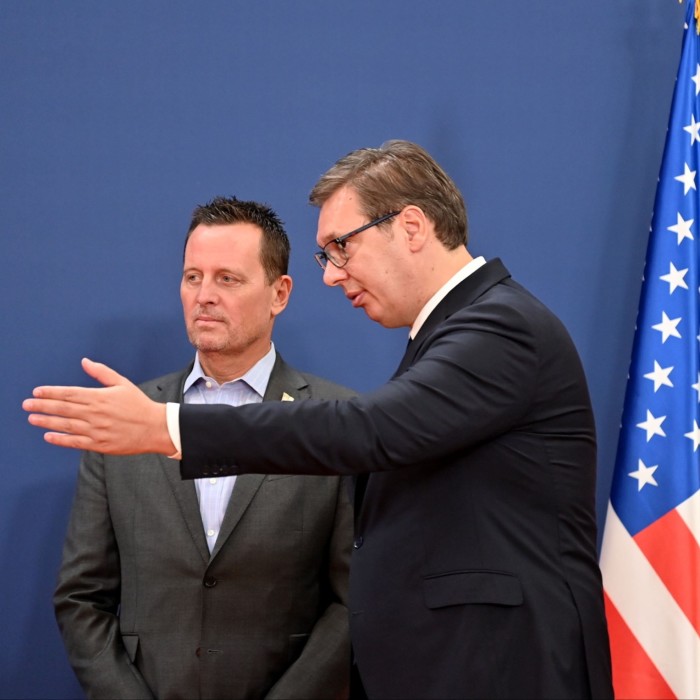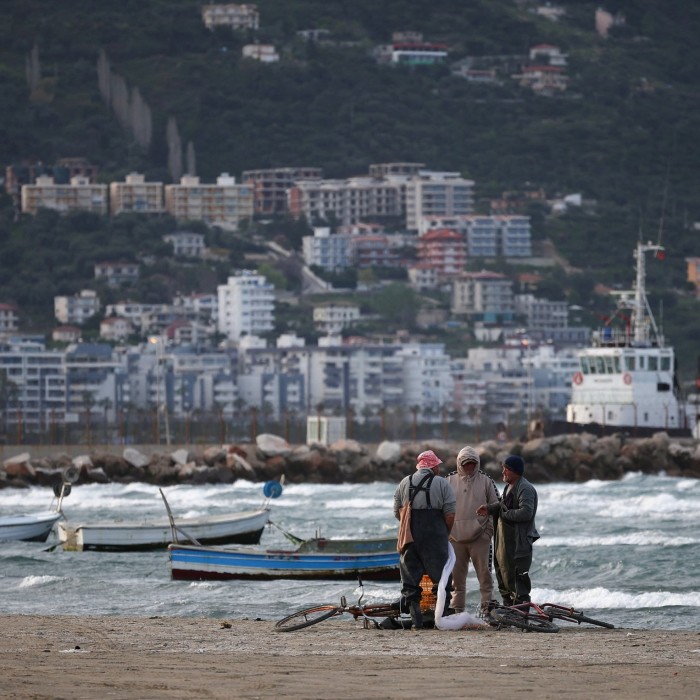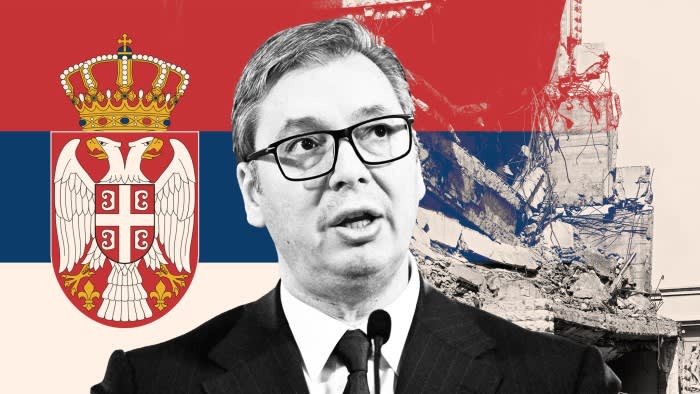A bus passes the ruined building that once housed Yugoslavia’s Ministry of Defence, which is set to be redeveloped into a luxury hotel and apartments © Laszlo Balogh/FT
“I believe we have taken significant steps in pulling Serbia away from the influence of Russia and China and closer to the US,” he tells the FT. “I also recognise that more needs to be done and I am committed to doing just that.”
To pre-empt criticism of the deal from the powerful rightwing Serbian nationalist lobby, which is strongly pro-Moscow, the investors have committed to building on the site a memorial to the victims of Nato’s bombing, in consultation with Serbian architects.
Simultaneously, Kushner is planning to invest in a luxury tourism project in nearby Albania to the delight of its prime minister, Edi Rama. “We need super luxury like a desert needs water,” Rama says, adding that Kushner and Grenell made the overture to Albania before then turning to invest in Serbia. The only difference, he adds, is that in Albania it was Kushner, not Grenell, who made the initial approach. “In Serbia for sure Grenell was the introducer, but here no,” Rama says.
In Washington the announcement of the deals raised questions over a possible conflict of interest if Trump does return to office. Grenell and Kushner have rejected this, arguing that they are acting as private citizens. Kushner has said in the event of a second Trump term he would not have a role in the administration.

In Europe, the Belgrade deal is seen as a classic bet-hedging manoeuvre by the 54-year-old Vučić, who has dominated domestic and regional politics for a decade — for three years as Serbia’s prime minister and then seven as president — and likes to play off America and the EU against Russia and China.
“He is a keen player of chess,” says Milan Antonijević, a Serbian lawyer and human rights expert, who portrays Vučić as trying to pursue a middle course that best suits Serbia’s long-term interests in an increasingly multipolar world.
“And he knows we don’t have that many players on the global chessboard.”
Vučić has an actual chessboard with a timer in his library. If he were depicted as a piece, he would probably be a bishop zigzagging across the board. In the FT interview, he presents the current age of global flux as a time rich with potential — although also peril — for Serbia.
Even while working with Trump’s allies — and increasingly closely with the Biden administration, too — Vučić has nurtured a relationship with America’s great-power rival, China, for investment. He has also maintained Serbia’s sentimental link with Moscow, albeit mainly via proxies and while keeping Russia’s president, Vladimir Putin, at a distance. Serbian nationalists, a powerful force in domestic politics, see Russia as a Slavic soulmate.
Serbs have a “calculated” love for China, says Srđan Bogosavljević, Serbia’s leading pollster, and an “irrational” love for Russia. Accordingly, Serbia is one of only two European countries — the other is Belarus — not to support sanctions against Russia. As for Beijing, Serbia and Hungary were the only two European countries China’s President Xi Jinping visited in May after his state visit to France. China has invested heavily and often tops Serbian opinion polls as the most popular foreign power.
And yet at the same time, Vučić has fostered ties with France’s President Emmanuel Macron and is pushing to work with the EU to help develop potentially Europe’s largest lithium mine in western Serbia, a multibillion-euro project. Vučić insists his goal is membership of the EU, Serbia’s top trade partner. It has been a candidate for 12 years but made little headway in overcoming the EU’s concerns over its commitment to the rule of law and over the unsettled status of the former province of Kosovo.
“Vučić has a catch-all policy,” says Ivan Vejvoda, a fellow at the Institute for Human Sciences in Vienna. “One moment you have Xi visiting. Then . . . days later, Zelenska [the first lady of Ukraine] and Dmytro Kuleba [Ukraine’s foreign minister] come. Then he goes to the Russian cultural centre and gives a revisionist speech. And then, two days later, he is with the EU, talking about growth plans.”
Asked if he believes in the EU, Vučić sidesteps the question. “I’m not someone who would defend or attack it,” he says. “When you see people are very ardent in attacking the EU I don’t go there because those people are not rational. But when I see the hysteria about so-called EU values I do the same.”
There is too much EU groupthink, he says. “If you go to [EU] meetings, it’s going to be a big pro-Ukrainian rally. If someone doesn’t say what everyone expects, it’s like they are an intruder . . . No one wants to hear different opinions.”
He also, however, recounts how when the head of state of a new member of the Brics — the group of emerging powers led by Brazil, Russia, India, China and South Africa — suggested he join, on the grounds that the west was waning, he turned down the offer. “I told him we are on our EU path.”
For western powers, Russia’s full-scale invasion of Ukraine made courting Vučić a priority, amid lingering concern that Moscow could seek to stir up animosities in neighbouring Bosnia-Herzegovina and Kosovo, which have restive Serb minorities.
Western diplomats and regional analysts believe he is tilting to the west. In his FT interview he presents his anti-sanctions stance as stemming from an aversion to sanctions after their imposition against Serbia during the 1990s Balkan wars. He also all but confirms that he has discreetly aided Kyiv by selling ammunition to third parties which ends up with Ukraine’s armed forces.
Serbia: in numbers$75.2bn
GDP (all figures 2023)
“Vučić is neither a Russian proxy nor a little Putin, as he is sometimes portrayed,” says Vejvoda. “Do most Serbs love Putin? Yes. Do they love Russia? Yes. But when asked where you want to travel, they all want to go to western Europe.”
Vučić might be best described as a chameleon. He started in politics as an extreme nationalist and while he has tacked to the centre, he still regularly plays the nationalist card to shore up support on the right, most recently hosting a pan-Serb meeting in Belgrade. To his critics, he is little different from Viktor Orbán, the illiberal Hungarian prime minister, a Trump fan who vilifies the EU and Nato’s stance on Ukraine.
“He [Vučić] has corrupted the state,” says Dragan Đilas, founder and leader of the Party of Freedom and Justice, Serbia’s largest opposition party. “The prosecutors, for example, are a disaster, totally politicised. Vučić is not popular in Belgrade but he understands that nationalism is the number one way to stay in power.”
Yet at the same time he has forged a friendship with Alex Soros, the investor and philanthropist who heads the board of the Open Society Foundations founded by his father George — long abhorred by supporters of Orbán and Trump as an agent of pernicious liberalism. If anything Vučić is Orbán-lite, analysts suggest. While Vučić echoes Orbán, “it is not a copycat routine”, says the lawyer Antonijević, who says the media in Serbia for example is less controlled than in Hungary.
The Biden administration has invested time and money in bringing Vučić into the west’s camp, and has backed an ambitious solar power project in Serbia. There is no doubt, however, that Trump would be a more natural partner than Biden. “He believes if Trump wins it will be good for him,” says a European diplomat. “Grenell has been very active in the region in the last four years, on the side of Belgrade.”
When asked how a second Trump term could impact Serbia, Vučić hedges his bets. “I am not as big a leader as many others in Europe that are taking sides,” he says. “My friend Viktor [Orbán], he is 100 per cent on Trump’s side. My friends from Brussels, they are 100 per cent on Biden’s side. I’m not. I’m on the Serbian side waiting for the results.”
But he goes on to recall a visit to Trump’s White House — and to contrast that with perfunctory encounters with Biden. “When I visited the White House it was at a time of big disagreements with Rick Grenell, but he was a very diligent, very dedicated person. We had almost three hours of discussion in a submarine-like room. I cannot say that now I have the same treatment. But I can say I had a good talk with Trump.
“I had good talks with Biden before he became president. After that I met him once, twice at receptions for two minutes, but not substantive talks. If you ask most Serbs, 90 per cent will be on Trump’s side.”
The big question for the region now is how Trump’s re-election might affect the thorny, lingering divisions among Serbia’s closest neighbours.
On the road from the airport leading into Belgrade, large black letters stretch over an overpass: “Kosovo is Serbia.” The other side of the overpass, visible to those leaving the city, reads: “Remember — Kosovo is Serbia.”
The status of Kosovo, the fabled birthplace of the Serbian nation, has been a political sore in the region since 1999 when Nato’s bombing campaign paved the way for the former province to declare independence from Serbia in 2008.
Even if Vučić wanted to call a referendum on Kosovo’s independence, he couldn’t get it passed
EU negotiators last year brokered a tentative deal, backed by the Biden administration, under which Belgrade would informally allow Kosovo to integrate into international organisations while Pristina would grant greater autonomy to regions with Serb majorities. But the agreement has never been implemented.
The intensity of negotiations could increase dramatically if Trump is re-elected. Grenell has signalled in private discussions that if he is appointed to a senior role in a possible second Trump term the Balkans would be a priority for him, and that he sees Serbia and the region as a natural ally of America.
When Grenell was Balkans envoy, he pushed hard for a deal over Kosovo, according to diplomats in the region. He cut across the strategies of the EU in arguing for a quick fix, infuriating many European officials and some state department diplomats with his confrontational tone.
He also made clear he had little time for the stance of Albin Kurti, Kosovo’s prime minister. In the past year, EU officials and the Biden administration have also become frustrated with Kurti, accusing him of being uncompromising and undermining hope of a settlement.
Kosovan officials and domestic opponents worry that a second Trump administration would be soft on Vučić. Allies of Grenell respond by pointing to how he has, in the past, put pressure on Vučić to move away from Moscow and pushed him to diversify his energy supply from Russia, which provides most of Serbia’s gas.
For Vučić, an accelerated push for a deal would pose a dilemma. Accepting Kosovo’s independence is a formal condition for Serbia’s integration into the EU. Yet to give in to western pressure and agree to it could be political suicide. “No one has been as popular as Vučić in the last 30 years,” says Bogosavljević, the pollster. “But even with this popularity, even if he wanted to call a referendum on Kosovo’s independence he couldn’t get it passed.”
Pivoting from Kosovo, Vučić has recently whipped up a surge of nationalist sentiment over Bosnia. Yet western diplomats say they believe him when he says his priority is economic development. His main project, which will coincide with the scheduled end of his presidency in 2027, is the Expo, the world fair he hopes will set Serbia on a new economic path. “When I speak about the Expo, I speak about substantive changes of this country,” he says.
In this context, Vučić sees opportunities for investment whoever wins the US election — pointing to real estate projects on the lines of the Kushner/Grenell deal as well as the Belgrade Waterfront, a development on the bank of the River Sava. This was backed by the same Emirati developer, Mohamed Alabbar, who was behind the Durrës Marina in Albania.
For his despairing opponents such talk is cheap. They see Vučić as an untrustworthy Janus-figure. Vučić shrugs off the critique and says that everyone has to know how to change. “You need to learn every single day,” he says. “Only donkeys don’t change their minds.”
Source link : https://www.ft.com/content/00f2269b-4a9e-468b-a777-12341817fde9
Author :
Publish date : 2024-07-08 07:00:00
Copyright for syndicated content belongs to the linked Source.
